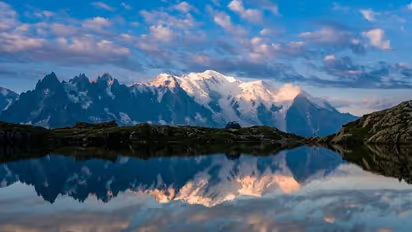Alarming! In just 2 years, Mont Blanc witnesses loss of snow equivalent to an Olympic pool

Synopsis
Mont Blanc, France's tallest mountain, has experienced a reduction in height over two years, with potential links to climate change, as scientists measure its summit's fluctuations.
According to recent research reported by the BBC, Mont Blanc, the tallest mountain in France, has experienced a reduction in height over the last two years. The mountain's peak has been measured at 4,805.59 meters, which is 2.22 meters shorter than its measurement in 2021. Mont Blanc is regularly monitored by climate scientists every two years to assess the impact of climate change on the Alps.
Chief geometer Jean des Garets explained that this decrease in height could potentially be attributed to reduced rainfall during the summer. He emphasized that the summit of Mont Blanc is in constant flux, both in terms of altitude and position, with fluctuations of up to five meters. Garets mentioned to the BBC that Mont Blanc's height might vary significantly in the next two years.
However, other experts suggest a more substantial rate of height loss, estimating that the mountain loses around 13 centimeters of height each year.
The recent survey was conducted by a team from the Haute-Savoie regional administration, with the assistance of a drone, as reported by The Guardian.
In 2021, the summit's height was recorded at 4,807.81 meters, which marked a decrease of nearly one meter compared to measurements taken in 2017.
Denis Borel, one of the surveyors involved, highlighted that the mountain had lost approximately "3,500 cubic meters of ice and snow" compared to the volume measured in 2021. This loss is roughly equivalent to the volume of an Olympic-sized swimming pool. Borel also noted that this reduction was "quite considerable" when compared to measurements from previous years.
Despite the observed changes in Mont Blanc's summit, climatologists caution against directly linking this phenomenon to the broader loss of glacial ice cover in the Alps. According to Borrel, climatologists and glaciologists argue that it would require approximately 50 years of measurements to draw conclusions about potential global warming at the high altitude of 4,800 meters. He further explained that variations in the summit's ice cover are influenced by factors such as wind patterns and precipitation.
The evolving height of Mont Blanc serves as a reminder of the dynamic nature of mountain environments and the ongoing concerns surrounding climate change and its potential impact on these iconic natural landmarks.
Check the Breaking News Today and Latest News from across India and around the world. Stay updated with the latest World News and global developments from politics to economy and current affairs. Get in-depth coverage of China News, Europe News, Pakistan News, and South Asia News, along with top headlines from the UK and US. Follow expert analysis, international trends, and breaking updates from around the globe. Download the Asianet News Official App from the Android Play Store and iPhone App Store for accurate and timely news updates anytime, anywhere.